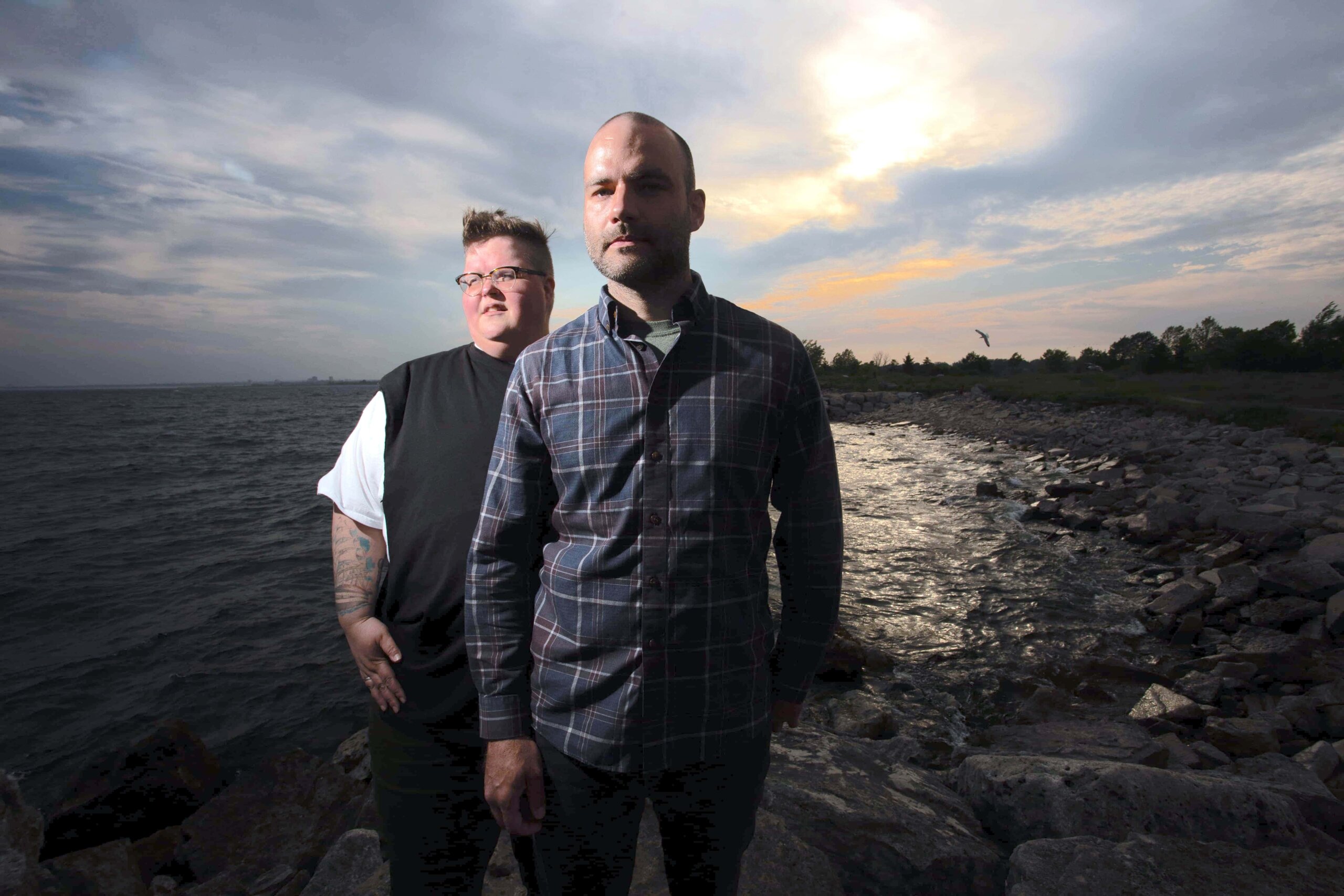How does it feel to be exiled from your community? That’s the question Joyful Joyful vocalist Cormac Culkeen had to reckon with at age 21 after coming out to fellow members of their Christian Evangelical church in their hometown of Peterborough, Ontario. Born again as a teenager, Culkeen earned a Bible college degree and became deeply involved in the church’s outreach efforts. This devotion turned to devastation when they came out; Culkeen was met with judgment instead of love and acceptance.
“People told me I was being tempted by Satan and allowing him to win,” says Culkeen on a Zoom call with Xtra. “That was heartbreaking, quite honestly. These are good people who cared a lot about me, but the only way they knew how to express that was to try and save my soul. One of the really difficult things about being exiled from a religious community is that it’s not only people and a place, but also feels like God is pushing you out.”
Culkeen first joined a choir at age five at a United church next to their elementary school. “They had two free cookies and a glass of Tang for every kid that showed up,” they recall, laughing. During Culkeen’s teenage years, when they were more actively involved in the church, the only relationship models presented were heteronormative, where sex is a sacred gift given to married, cisgender men and women. Alongside homophobia, there was no positive talk about sexuality; only restrictions.
“Purity culture was at its peak, and everyone was trying to not have sex with each other,” says Culkeen. “People were certainly sex-negative about queerness, but also sex-negative about sex in general. I didn’t realize I was queer because I didn’t have the normal attraction to men. I didn’t want to be a woman with a boyfriend, but it’s because I’m not a woman and I’m super queer. I didn’t recognize that in myself because it didn’t seem possible.”
Culkeen met their Joyful Joyful bandmate Dave Grenon at a Peterborough community radio station, where they occasionally appeared on each other’s noise music shows. Prior to coming together as a duo, Culkeen performed with folk groups including Tin Vespers, while Grenon played with absurdist art-rock trio hello babies.
In 2016, Grenon and Culkeen linked up onstage as Joyful Joyful for the first time, filming a live, improvised version of the song “Sebaldus,” which became the sprawling, 12-minute finale of their debut album. Drenched in electronic effects like Laurie Anderson or Imogen Heap, Culkeen sings about a ninth-century hermit surviving the harsh winter, while hinting at repressed desires.
“When Diamanda Galas performs, she sounds like 15 people and a legion of demons! That’s what I’m going for.”
Five years later, when they were offered the opportunity from their new label Idée Fixe to record at Toronto’s Sonology studio, Joyful Joyful were given access to more keyboards and effects than they’d ever had in their live performances. Processing layer upon layer of Culkeen’s vocals, their recordings ring out with the vastness of a one-person choir, transforming the human voice into something otherworldly. “I want to sound superhuman or monstrous, in a good way,” says Culkeen. “Rather than just one entity, I want to sound like an array [of voices], and not all of them beautiful. When Diamanda Galas performs, she sounds like 15 people and a legion of demons! That’s what I’m going for.”
Using recordings from the previous years of their improvised live performances as the album’s foundation, the duo stacked these vocal tracks onto sustained synth notes and sounds recorded in nature to create expansive, reverent drone-hymns. “The heart of every song is Cormac’s voice,” says Grenon in the same three-way Zoom call with Culkeen and Xtra. “Yet rather than replicating what we’ve been doing live, we found something new.”
Joyful Joyful’s debut album certainly does feel new in comparison to the ancient devotional music that it draws upon. In the video for their song “Marrow,” directed by Glammy Lee and Twiggy Saint Skookum, the duo appear in costumes in a monochromatic queer fantasy world. Lifted by a synth drone like Alice Coltrane’s 1982 album Turiya Sings, “Oh Jubilation” sounds solemn, yet Culkeen sings praises to human connection: “Come now, let us renounce our art—it’s blasphemous/ For what is art compared to your skin and nights like this?”
Instead of considering their music to be queering sacred traditions, Culkeen argues that sacred traditions have been queer the whole time. “One of the things that was very healing for me is that no one could tell me that I couldn’t sing hymns. We have hundreds and hundreds of years of people trying to take traditions from queer people, but it’s inalienable. Holding on to my love of those traditions has been really important for me, and it’s an endless well. You can’t exhaust it.”
With another album’s worth of material ready to record, Joyful Joyful are currently in the process of expanding to an ensemble featuring classical musicians and additional vocalists. “We’re building and growing,” says Grenon. “There are many big ideas and many plans.” These can only occur since Culkeen has found a sense of tranquillity over the past decade, living and working with a new community that accepts them for who they are.
“About seven years ago, I got a job with an Anglican church in Toronto,” says Culkeen. “It has been a return, but it’s not the same. I’m still kind of a newbie to the Anglican traditions in a lot of ways, but I’m attempting some kind of reconciliation with all of these parts of myself and all of these things that I’ve been. There has to be space for it all, because I’m here!”


 Why you can trust Xtra
Why you can trust Xtra


